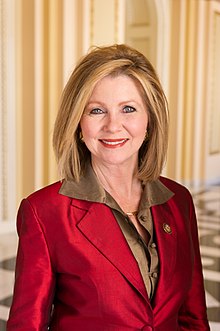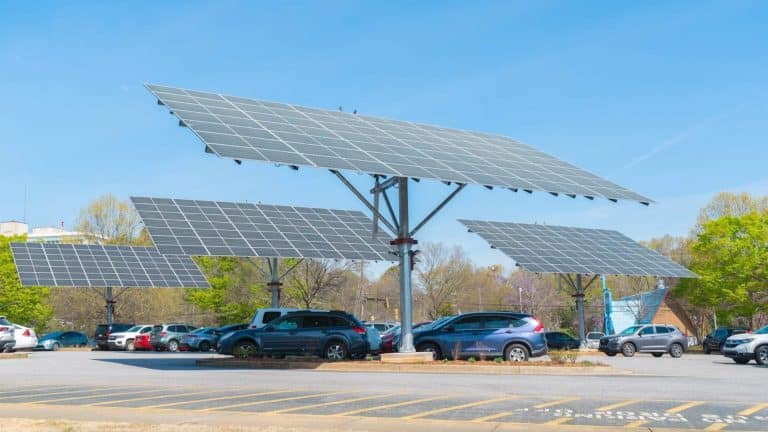This post is the eighth post in a series of blogs examining where 2018 candidates for state and federal offices in the Southeast stand on key energy and climate issues. To read the candidate profile for Democratic Nominee for Tennessee Senator, Phil Bredesen, click here.
Note: The Southern Alliance for Clean Energy does not support or oppose candidates or political parties. Links to reports, candidate websites and outside sources are provided as citizen education tools.
Candidate: Marsha Blackburn
In this blog, we examine the policies and positions of Marsha Blackburn, the Congresswoman currently representing Tennessee’s 7th Congressional district. SACE is committed to evaluating the energy platforms of both major party candidates running for Senator of Tennessee and we encourage Tennessee voters to tune into a live upcoming debate between Congresswoman Marsha Blackburn and former Governor Phil Bredesen on September 25 at historic Cumberland University in Lebanon. Go here for more info on this debate.
Renewables
Blackburn has been a member for many years on the U.S. House of Representatives’ Energy and Commerce Committee, and since 2011 she has served as Vice Chair. According to her Congressional website, Blackburn supports “a menu of clean, responsible energy options; not winners and losers chosen by the environmental lobby, in order to bring down the price at the pump and keep the economy going.” However, Blackburn voted against tax incentives for renewable energy via the Renewable Energy and Energy Conservation Tax Act in 2008 (Bill H.R.5351) put forward in an attempt to extend tax credits for the production of electricity from renewable resources (e.g., wind, biomass, geothermal, and hydropower) through 2011.
Energy Efficiency
While we could find no direct quote referencing Blackburn’s position on energy efficiency, in 2011 she was a co-sponsor for the Stop Green Initiative Abuse Act (H.R.3441), a bill seeking to defund the Weatherization Assistance Program (WAP), which provides free weatherization services for low-income households. The WAP had historically been ignored by politicians as a cost-cutting target because its annual budget was, at a few million dollars, relatively small. But its budget increased to about $5 billion under the federal stimulus program passed early in 2009. H.R. 3441 did not make it out of committee.
Clean Transportation
We could find no statements indicating Blackburn’s support of or opposition to electric vehicles, despite the fact that Nissan manufacturers the all-electric Nissan LEAF at the Smynra Vehicle Assembly Plant, located in the neighboring 4th Congressional district represented by Rep. Scott deJarlais. The Nissan LEAF has been in production at Smyrna since 2013, resulting in $6 billion in economic investment and a local workforce of more than 8,000 people, some of whom may reside in Rep. Blackburn’s district.
Climate Change
According to her Congressional website, Blackburn opposes cap and trade, one policy option that has been proposed as a means of capping the amount of carbon polluting emissions. During a previous Congress, Blackburn sponsored H.R. 97 to prohibit the Environmental Protection Agency from regulating carbon emissions under the Clean Air Act.
Blackburn has been very vocal on the issue of climate change insisting that there is still debate on human participation in global warming. She maintains that she is a “believer in clean air and clean water” but that “when you look at global warming or climate change, as it is now popularly called, that it is cyclical and you have to look at it in terms of centuries, not in terms of decades.” Referring to then-President Obama, Blackburn tweeted this in 2014 referring not to changing climatic systems but to changing political systems: “The only climate change POTUS should talk about is the changing climate that let’s [sic] terrorism flourish.”
Blackburn’s most high profile action around climate change may have been when she debated the issue in 2014 with Bill Nye on the Sunday talk show Meet the Press, maintaining through the use of misinformation her position that there’s no consensus on climate change, as this article in The Atlantic documents.
Fossil Fuels
After the U.S. Supreme Court temporarily blocked a key measure in the Clean Power Plan in 2016, Blackburn’s office issued a statement where she said, “There is a war being waged on energy and on coal in this country, but it’s not being waged from abroad, it’s coming from our own government. Affordable, reliable energy is critical for American jobs and economic growth, but the President would rather force his liberal climate agenda than protect the pockets of hardworking Americans.”
Although Blackburn has voted against extending government tax credits for renewable energy production, in 2007 she voted “no” to the Creating Long-Term Energy Alternatives for the Nation (CLEAN) Act (Bill HR 6) in an effort to retain similar tax credits that support oil & gas exploration. Despite her “no” vote, the renewable tax credit bill did pass in January 2007 and became law.
In May of 2011, Blackburn voted in favor of reversing then-President Obama’s Offshore Moratorium Act (vote number 11-HV320) which was a vote in favor of opening the Outer Continental Shelf to offshore oil drilling. Five years before, in 2006, Blackburn voted in favor of lifting the 25-year moratorium on drilling for oil offshore (the Deep Ocean Energy Resources Act; Bill H.R. 4761).
Nuclear
Blackburn has stated her support for nuclear energy noting that “we need to pursue clean, economical and responsible energy options that ensure we have access to the energy we need – including natural gas, nuclear, and coal.” In 2015, she spoke on the floor of the U.S. House about the need to promote energy options like the Tennessee Valley Authority’s Watts Bar Nuclear facility (watch full video here). Earlier, in 2011, Blackburn warned that the U.S. was falling behind in nuclear technology, stating that “China has 25 nuclear power plants under construction and 50 more on the `drawing board,’ and the United States needs to build new reactors quicker in order to catch up with other countries.” Blackburn also praised Tennessee Senator Lamar Alexander’s call to build 100 new reactors over the next twenty years, calling that “a great concept.”
Summary
We encourage Tennessee voters to tune into a live upcoming debate between Congresswoman Marsha Blackburn and former Governor Phil Bredesen on September 25 at historic Cumberland University in Lebanon. Go here for more info on this debate.
We encourage you to register and then vote this November. Click here for voting resources provided by the Civic Tennessee/Clean Energy Voter. If you are inspired by this blog and have questions for the candidate, please contact her campaign here.


